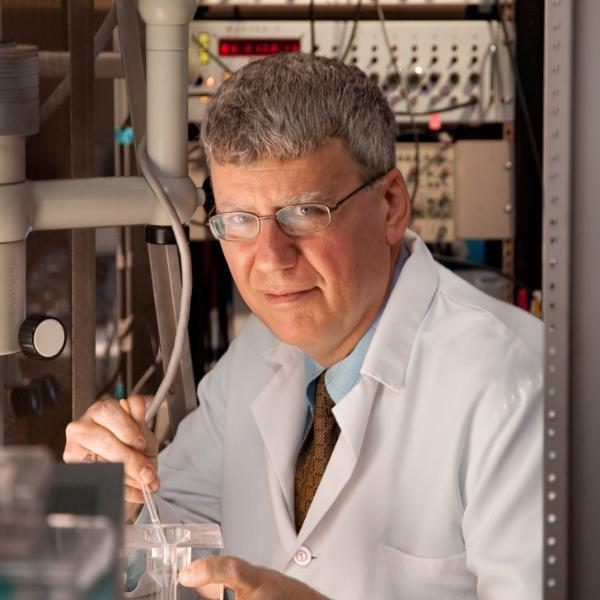Education
- Ph.D., Pharmacology, Uniformed Services University of the Health Sciences
- B.S., Natural Sciences, Johns Hopkins University
- Post-Graduate Studies, Neurophysiology, Max Planck Institute for Psychiatry
- Post-Graduate Studies, Biophysics, The Johns Hopkins University
Areas of Expertise
- Traumatic Brain Injury
- Seizure Research
Honors and Awards
- Alexander von Humboldt Foundation Fellow
- Klingenstein Fellow in the Neurosciences
- Office of Naval Research Young Investigator Award
- American Physiological Society Frontiers in Physiology Investigator
Research
Dr. Stanton's lab is investigating the cellular mechanisms underlying neuronal plasticity, including: 1) properties of long-term activity-dependent potentiation (LTP) and depression (LTD) of synaptic strength; 2) links between biochemical signaling cascades underlying LTD and LTP; 3) changes in synaptic function and structure associated with Alzheimer’s disease, traumatic brain injury, depression, stroke, migraine headache, perinatal lead exposure, and the development of epileptic seizures; and 4) cellular mechanisms that both trigger and prevent ischemia-induced delayed neuronal death.
They were the first to show that induction of mammalian LTP requires cyclic AMP and new protein synthesis, to characterize a form of LTD evoked when presynaptic inputs are active while postsynaptic neurons are hyperpolarized, and to discover that traumatic brain injury and chronic depression are associated with long-lasting damage to neuronal and axonal structure and impairments in long-term synaptic plasticity, which can be reversed by new drug treatments that they have developed that are now in clinical trials. His lab discovered a bidirectional cyclic nucleotide regulation of synaptic strength, chemical methods of inducing this and other forms of LTD, and pioneered the direct two-photon fluorescence imaging of presynaptic transmitter release to demonstrate that this form of LTD persistently alters the presynaptic transmitter release apparatus and glutamate release from the rapidly-recycling pool of transmitter vesicles. They employ extracellular and whole-cell patch clamp recordings, two-photon excitation, and confocal fluorescence imaging of functional synaptic networks in both acute in vitro slices and organotypic slice cultures from hippocampus and medial prefrontal neocortex.
Publications
- Zhang XL, Li YX, Berglund N, et. al. "Zelquistinel acts at an extracellular binding domain to modulate intracellular calcium inactivation of N-methyl-d-aspartate receptors." Neuropharmacology, 259(), (2024) 110100. doi: 10.1016/j.neuropharm.2024.110100
- Zhang XL, Hollander CM, Khan MY, et. al. "Myeloid cell deficiency of the inflammatory transcription factor Stat4 protects long-term synaptic plasticity from the effects of a high-fat, high-cholesterol diet." Communications biology, 6(1), (2023) 967. doi: 10.1038/s42003-023-05304-0
- Obot P, Subah G, Schonwald A, et. al. "Astrocyte and Neuronal Panx1 Support Long-Term Reference Memory in Mice." ASN neuro, 15(), (2023) 17590914231184712. doi: 10.1177/17590914231184712
- Obot P, Subah G, Schonwald A, et. al. "Astrocyte and neuronal Panx1 support long-term reference memory in mice." bioRxiv : the preprint server for biology, (), (2023) . pii: 2023.01.16.524236. doi: 10.1101/2023.01.16.524236
- Sharma DR, Cheng B, Jaiswal MK, et. al. "Elevated insulin growth factor-1 in dentate gyrus induces cognitive deficits in pre-term newborns." Cerebral cortex (New York, N.Y. : 1991), 33(10), (2023) 6449-6464. doi: 10.1093/cercor/bhac516
- Zhu Q, Mishra A, Park JS, et. al. "Human cortical interneurons optimized for grafting specifically integrate, abort seizures, and display prolonged efficacy without over-inhibition." Neuron, 111(6), (2023) 807-823.e7. doi: 10.1016/j.neuron.2022.12.014
- De Gregorio R, Subah G, Chan JC, et. al. "Sex-biased effects on hippocampal circuit development by perinatal SERT expression in CA3 pyramidal neurons." Development (Cambridge, England), 149(21), (2022) . doi: 10.1242/dev.200549
Professional Service
- Editor-in-Chief, NeuroReport
- Editor-in-Chief, Journal of Bioenergetics & Biomembranes
- NIH External Advisory Committee, University of New Mexico Center for Brain Recovery and Repair
- Member, Society for Neuroscience, International Brain Research Organization, New York Academy of Sciences, Society for Toxicology, Union of Concerned Scientists
Teaching Responsibilities
- Cellular Mechanisms of Learning and Memory
- Medical Neuroscience


